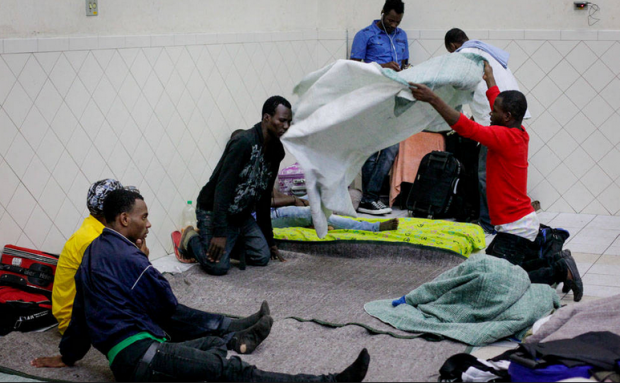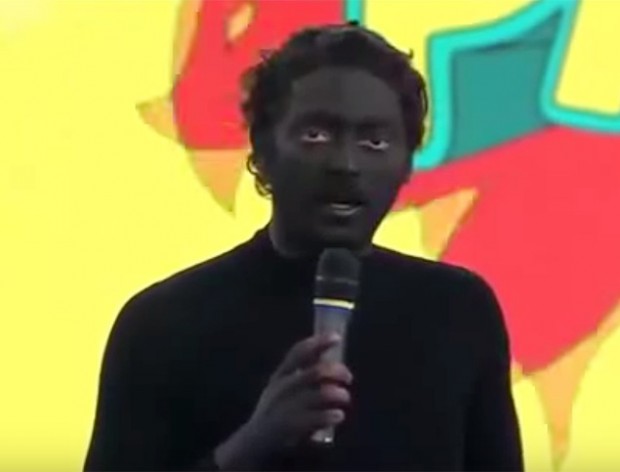Recent high-profile examples of prejudice have stirred up the complex race debate in Brazil, a country that has in the past claimed to be built on foundations of racial democracy.
By James Young
Belo Horizonte
From the glorious colonial architecture of Ouro Preto in the hills of Minas Gerais to the exquisite Teatro Amazonas in Manaus, Brazil is justifiably proud of the evidence of its rich history and culture. But a recent trip back into another kind of past – the blackface tradition of US theatre, or some of the darkest moments of 1970s UK TV, for example – has left more than a few Brazilians feeling squeamish.
Most famous for its scantily clad Panicat dancers, the puerile Pânico Na Band comedy show is not known for scaling intellectual heights. In recent weeks, however, it has plumbed new depths with the introduction of a character known only as The African, played by “blacked-up” white actor Eduardo Sterblitch, who speaks only in grunts and shrieks and acts in what the show’s creators presumably believe constitutes typical “African” behaviour – scratching at all parts of his body, tearing at plants and leaves and performing a dance of thanks for the judges of a cooking contest.
The show caused outrage among some Brazilians, with the National Black Slavery Truth Commission, an initiative of the Brazilian Bar Association, stating that the character was a “racial affront” which contributed to the “perpetuation of the effects and vestiges of slavery.”
Sterblich has since apologised for his performance, while Pânico has said that it intends to remove the character from the show, before rather spoiling the gesture by offering up the dubious defence that the program makes fun of “Mexicans, Chinese and Arabs” as well.
It is the latest in a string of recent racism-linked episodes in the media or involving well-known Brazilians. Last month the black presenter of the weather segment on the Globo TV network’s nightly news program, Maria Júlia Coutinho, was abused with a string of racist comments on the show’s Facebook page.
This week Flamengo boss Cristóvão Borges claimed that some of the deluge of criticism he has received during his career “has a racial connotation…I was even called the Mourinho of the Pelourinho”, a reference to Chelsea boss Jose and the historic district of Borges’ home city of Salvador, Brazil’s most African-influenced city, the name of which is taken from the Portuguese word for a slave-era whipping post.
Like the “monkey” chants aimed at the black goalkeeper Aranha during last year’s Copa do Brasil tie between Grêmio and Santos, the incidents have brought the issue of racism in Brazil to the fore, and provided further evidence of the myth of the theory of democracia racial – the idea that the country, with its complex racial mix of indigenous peoples, European colonizers, African slaves, and later large-scale immigration from countries such as Japan, Italy and Germany, would somehow magically avoid the racial conflicts seen in other nations.
The high-profile examples above rather give the lie to such a notion, as does the sheer weight of statistics describing the different realities of life for Brazil’s racial groups. A 2014 study by the Brazilian Public Security Forum found that the murder rate among young black Brazilians in 2012 was 70.8%, compared to 27.8% among their white equivalents.
“There are more than 30,000 young people with this profile (black) murdered every year. It’s as though a full plane crashes every day,” said Atilia Roque, director of Amnesty International in Brazil, on the launch of the “Keep Black Youth Alive” campaign to bring attention to the issue. Another report last year found that black or brown-skinned Brazilians earn slightly over half the average salary of white workers.

Yet despite Brazil’s great racial divide, visibly obvious everywhere from expensive restaurants to public hospitals, or etched on the faces of the manual workers queueing in early morning bus lines, the race debate is largely played out at low volume here. “If I went after everybody who called me black, I would have sued the whole world,” Pelé said earlier this year, when advising Aranha that “indifference” was the best form of defence against the racists, while the expression “Brazil is not a racist country” is commonly heard.
Part of that is down to the difficulties of racial classification in a country where there has been intermingling between different ethnic groups for so long. A recent survey found that 53% of Brazilians described themselves as “black” or “brown”, but the numbers of people declaring themselves as negro, branco or pardo (brown skinned or mixed race) can vary considerably from one study to another, based on the current cultural and social mood.
The concept that one’s racial identity can be flexible was summed up neatly by the footballer-turned-senator Romario when talking about Neymar. “I’m black,” he said, “If (he) doesn’t consider himself black, then he’s not. It’s up to him.” And a 1980 survey by the historian Clovis Moura identified 136 types of racial classification that Brazilians use to describe themselves, including “milky coffee”, “dirty white” and “cinnamon.”
At the same time, black consciousness in Brazil has grown in recent years through the activities of social groups and initiatives such as Dia Nacional da Consciência Negra, or National Black Consciousness Day. “I became black – it was a process…but the fact that I had to “learn” to be black is terrible,” the actress Jana Guinond has said of her eventual decision to describe herself as negra.
Episodes like that of “The African” and the affronts suffered by Cristóvão Borges and Maria Júlia Coutinho raise another issue in Brazil’s race debate – the local habit of using racially based slang terms such as Negão (“Big Black”), or Pretinha (“Little Black Girl”) or Japa (“Japanese-Brazilian”) to describe people.
Brazilians are fond of saying that such terms are mostly affectionate, not intended to be offensive, and used for physical description only. Subconsciously or otherwise, however, such language is surely built on stereotypes, and it seems unthinkable that such terms would be used in countries where the racial discussion is more sensitive.
And Brazilians may now have another area of potential racial conflict with which to deal. The shooting of six Haitian immigrants by a man with a pellet gun in the centre of São Paulo two weeks ago was notable for the fact that the shooter was reported to have shouted “you stole our jobs” after pulling the trigger.
Some estimates say over 50,000 Haitians have moved to Brazil since 2012, and the shooting felt like an unsettling echo of the resentment and xenophobia that surrounds immigration, often from Africa or Eastern Europe, into the wealthier countries of the EU, particularly when such countries are experiencing the kind of economic recession that Brazil is undergoing today.
If such unpleasant incidents have an upside, however, it is that from racist TV characters and football fans to anti-immigrant feeling, the race debate in Brazil seems slowly to be getting louder – and perhaps not before time.


